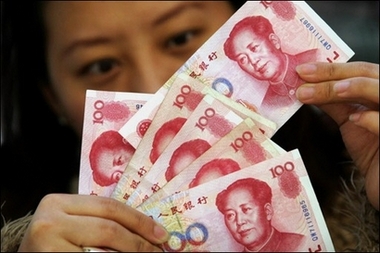China will boost imports, loosen controls on
outflows of capital and make the yuan more flexible to help curb a record trade
surplus and slow the fastest economic growth in a decade, the central bank said.
The People's Bank of China will "adjust the policy bias" that encourages
exports, the central bank said in a second-quarter monetary report posted on its
Web site Wednesday. It forecast the economy will slow "slightly" in the second
half, after expanding 10.9 percent in the first six months.

A Chinese customer shows off a
handfull of hundred-yuan notes at a local bank in Beijing, May 2006.
[AFP/file] |
China's trade surplus swelled 50 percent in the first half of the year to
US$61.5 billion, flooding the world's fourth-largest economy with cash and
complicating government efforts to cool investment. A stronger yuan may help
ease inflows, making it easier for the government to prevent the economy from
overheating.
"Today's report indicates the government is going to give a more prominent
role to the exchange rate and the current account and capital account surplus in
controlling the domestic economic situation of overheating and fast investment
growth," said Wang Qing, head of economics and strategy at Bank of America in
Hong Kong.
China's trade surplus in July hit a record US$14.61 billion, with export
up 22.6 percent to US$80.34 billion from a year ago, and imports up 19.7
percent to US$65.72 billion, the Shanghai Securities News reported, citing an
unnamed customs official.
The report said exports for the seven months to July rose 24.8 percent to
US$508.9 billion. Imports for the period were up 21.1 percent at US$432.95
billion.
Premier Wen Jiabao last month called the "intensifying imbalance in
international payments" one of the country's five most prominent economic
problems.
Yuan Rate
The central bank reiterated its pledge on Aug. 2 to use a mix of monetary
tools including a more flexible exchange rate to rein in the economy.
The exchange-rate system introduced last year, when China revalued the yuan
and ended a decade-old peg to the U.S. dollar, is helping to "balance" the
economy, the central bank said in Wednesday's report. The market is playing a
bigger role in setting the exchange rate, it said.
But the bank said that China cannot rely solely on currency appreciation to
balance its external payments.
"As part of a policy package, the exchange rate can play a certain role in
adjusting the imbalance in international payments. But the fundamental way to
resolve the international payment imbalance should come from expanding domestic
demand and lowering the savings rate."
The yuan fell 0.08 percent to 7.9772 per dollar as of 3:30 p.m. in Shanghai.
It has gained 1.7 percent since China revalued the currency on July 21, 2005.
The currency last month had its biggest monthly gain since the revaluation,
rising 0.36 percent.
U.S. lawmakers say the yuan is kept artificially weak to give Chinese goods
an unfair competitive advantage, and are threatening to impose punitive tariffs
on imports from China unless the currency is allowed to gain more rapidly.
The central bank is also considering expanding overseas investment as a way
to slow the rapid growth in foreign exchange reserves.
China's foreign exchange reserves, driven by the ballooning foreign trade
surplus and foreign investment inflow, had shot up to US$941.1 billion by the
end of June.